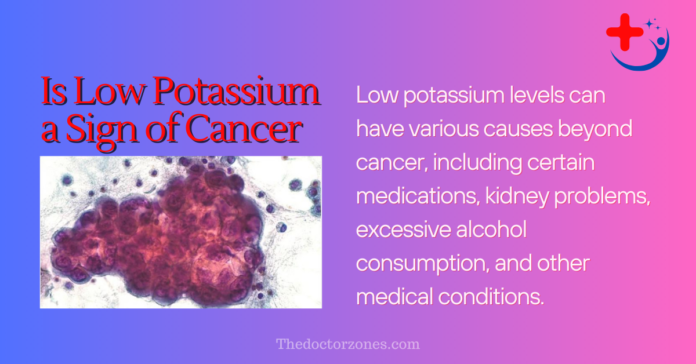Is Low Potassium a Sign of Cancer?
Potassium is a vital mineral that plays a crucial role in maintaining several bodily functions. It helps regulate fluid balance, muscle contractions, and nerve signals. Adequate potassium levels are essential for heart health and overall well-being. When potassium levels drop too low, it can lead to a condition known as hypokalemia.
Understanding Hypokalemia (Low Potassium)
Hypokalemia occurs when the potassium levels in your blood are below the normal range. This can result from various factors, including diet, medications, and certain medical conditions. Symptoms can range from mild to severe and may include muscle weakness, cramps, and irregular heartbeats.
Symptoms of Low Potassium in the Elderly
Elderly individuals are particularly vulnerable to hypokalemia. Symptoms of low potassium in the elderly can include:
- Muscle weakness
- Fatigue
- Cramps
- Irregular heartbeat
- Confusion
- Difficulty breathing
Recognizing these symptoms early is crucial as they can be mistaken for normal aging or other health issues. Read about How Does Cancer Man Test You
Common Causes of Low Potassium
Several factors can lead to low potassium levels, including:
- Poor dietary intake
- Excessive sweating
- Chronic kidney disease
- Certain medications (diuretics, laxatives)
- Gastrointestinal losses (vomiting, diarrhea)
- Hormonal imbalances
Understanding these causes can help in identifying and addressing the root of the problem.
Can Cancer Cause Low Potassium?
One of the pressing questions is, can cancer cause low potassium? While cancer itself may not directly cause hypokalemia, the treatments and complications associated with cancer can lead to low potassium levels. Chemotherapy, for instance, can disrupt electrolyte balance, including potassium.
Low Potassium and Cancer: The Connection
Low potassium and cancer are interconnected in several ways. For cancer patients, maintaining electrolyte balance is critical. Treatments like chemotherapy and radiation can impact the body’s ability to regulate potassium levels. Additionally, certain cancers can lead to conditions that affect potassium levels indirectly. Discover about Breast Cancer Screening ICD 10
What Cancers Cause Low Potassium?

Certain types of cancers are more likely to be associated with low potassium levels. These include:
- Kidney cancer
- Adrenal gland tumors
- Colon cancer
- Gastrointestinal cancers
These cancers can impact how the body manages potassium, either through direct tumor effects or as a result of treatments. Also read the Article: What Percentage of Positive Cologuard Tests Are Cancer
Primary Hyperaldosteronism and Primary Aldosteronism
Primary hyperaldosteronism and primary aldosteronism are conditions where the adrenal glands produce too much aldosterone, a hormone that regulates potassium and sodium levels. This overproduction can lead to low potassium levels. These conditions are sometimes linked to adrenal gland tumors, which can be cancerous.
Adrenal Gland and Potassium Levels
The adrenal glands play a vital role in maintaining potassium balance. When these glands are affected by tumors or cancer, it can lead to significant imbalances in potassium levels. This underscores the importance of monitoring adrenal health in cancer patients.
Low Potassium in Cancer Patients
Low potassium in cancer patients is a common issue due to the aggressive treatments required to combat the disease. Chemotherapy, radiation, and even some medications can deplete potassium levels. It’s essential for cancer patients to have their potassium levels monitored regularly.
What Organ Causes Low Potassium?

Several organs are involved in maintaining potassium levels, but the kidneys play the most critical role. When the kidneys are affected by disease or cancer, their ability to manage potassium can be compromised, leading to hypokalemia.
Is Low Potassium a Sign of Cancer?
While low potassium alone is not a definitive sign of cancer, it can be a symptom of underlying issues related to cancer or its treatment. Persistent low potassium levels, especially when accompanied by other symptoms, should prompt further medical investigation to rule out or confirm cancer.
How to Diagnose Low Potassium
Diagnosing low potassium involves a simple blood test to measure potassium levels. If hypokalemia is detected, further tests may be conducted to determine the underlying cause, including tests for kidney function, adrenal gland activity, and potential cancer screenings.
Treatment Options for Low Potassium
Treatment for low potassium depends on the underlying cause. Common treatments include:
- Potassium supplements
- Dietary changes to include potassium-rich foods
- Addressing the underlying medical condition
- Adjusting medications
For cancer patients, managing potassium levels may involve more complex strategies tailored to their specific treatment regimen.
Preventing Low Potassium Levels
Preventing low potassium involves maintaining a balanced diet rich in potassium, staying hydrated, and monitoring your health regularly. For those undergoing cancer treatment, working closely with healthcare providers to manage electrolyte balance is crucial.
Conclusion and Key Takeaways
Low potassium levels can be a significant health concern, particularly for cancer patients. While low potassium is not a direct sign of cancer, it is often related to cancer treatments and underlying health issues. Monitoring symptoms, maintaining a healthy diet, and seeking medical advice are essential steps in managing potassium levels.
FAQs on Low Potassium and Cancer
- Can cancer cause low potassium levels? Yes, certain factors related to cancer, such as chemotherapy and adrenal gland tumors, can lead to decreased potassium levels in the body.
- What kind of cancer causes low potassium? Cancers that affect the kidneys, adrenal glands, and gastrointestinal tract are more likely to result in low potassium levels.
- Is low potassium a sign of cancer? Low potassium alone is not a definitive sign of cancer, but it can indicate underlying health issues, including those related to cancer treatments.
- How is low potassium treated? Treatment depends on the underlying cause and may involve potassium supplements, dietary changes, and addressing specific health conditions.
- What are some potassium-rich foods? Potassium-rich foods include bananas, oranges, spinach, avocados, and potatoes.
- What organ causes low potassium? The kidneys play a critical role in regulating potassium levels. Dysfunction in the kidneys can lead to hypokalemia.
- Is potassium linked to cancer? While there’s no direct link between potassium and cancer, maintaining proper potassium levels is crucial for overall health, particularly for cancer patients.








